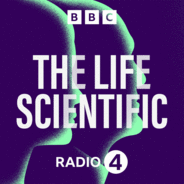Chris Jackson is the kind of scientist who just loves to get out into the landscape he loves. He’s often introduced as ‘geologist and adventurer’. For the past five years he’s been Professor of Basin Analysis in the Department of Earth Sciences and Engineering at Imperial College London and he’s now about to move back to the University of Manchester, where he studied as a student, to become Professor of Sustainable Geoscience.As a child growing up in Derby, Chris learned to love the outdoors on family trips to the Peak District. Recently, you may have seen him abseiling into a crater of an active volcano in the Democratic Republic of Congo for a BBC TV series. He’s also been telling us about the link between our planet’s geology and climate change as part of the recent Royal Institution Christmas lectures. Chris talks to Jim al-Khalili about working in the oil and gas exploration industry at the start of his career, searching for massive deposits of salt deep inside the earth and his experience of being a black geologist.

Wissenschaft & Technik
The Life Scientific Folgen
Professor Jim Al-Khalili talks to leading scientists about their life and work, finding out what inspires and motivates them and asking what their discoveries might do for us in the future
Folgen von The Life Scientific
346 Folgen
-
Folge vom 12.01.2021Chris Jackson on sustainable geology
-
Folge vom 15.12.2020Scientists in the Spotlight during the PandemicMore of us have been exposed to so more science than ever before during 2020. And our insatiable appetite for science shows no sign of diminishing. Back in 2019, most scientists struggled to get any media attention. Now scientists involved in fighting the pandemic are generating headlines almost daily. On top of working harder than ever to further our understanding of the virus, many have become public figures. Some have been caught in the headlights. Others have stepped into the footlights. Many have found themselves at the centre of highly politicised conversations - not something a scientific training prepares you for. And the fact that everyone is now an expert on R numbers and immunology has created a new set of challenges. Jim Al-Khalili explores how The Life Scientific has changed during the pandemic and asks if, during these difficult times, a new relationship between scientists and the media has been forged.We look to science for certainty (all the more so during uncertain times) but there is no magic moment when scientists can announce with absolute certainty that ‘this is how it is’. Now that science is being reported in real time, revealing all the ups and downs on the bumpy road to discovery is there a danger that our faith in science will be undermined. Or could one legacy of the pandemic be a much greater appreciation of the true nature of scientific knowledge and how it’s formed? Has good journalism helped science to progress by synthesising scientific findings and interpreting what they mean? And, when the pandemic is over, will scientists continue to be part of the national debate?Producer: Anna Buckley
-
Folge vom 22.09.2020Neil Ferguson on modelling Covid-19Neil Ferguson is known to many as Professor Lockdown. The mathematical models he created to predict the spread of Covid-19 were influential but, he says, it took him quite a long time to be persuaded that full lockdown was a good idea. A physicist by training, Neil switched from studying string theory to the spread of disease and presented scientific advice to government during the BSE crisis, an outbreak of foot and mouth disease in livestock in 2001 and the swine flu pandemic of 2009. In January 2020, he issued his first report on Covid-19 estimating the extent of the outbreak in Wuhan City in China. In March, he predicted that 510,000 people in the UK could die if nothing was done to mitigate the spread of this pandemic. Does he stand by that prediction? And how worried is he now? Jim Al-Khalili talks to Neil Ferguson about his life and work, the tricky relationship between politics and science and asks if he has any regrets about lockdown. Producer: Anna Buckley for BBC Radio Science
-
Folge vom 15.09.2020Sarah Gilbert on developing a vaccine for Covid-19Sarah Gilbert started working on a vaccine for Covid-19 just as soon as the virus genome was sequenced. Within weeks, she had a proof of principle. By early April, her team at the Jenner Institute in Oxford had manufactured hundreds of doses ready for use in clinical trials. In phase one of these trials, completed in July, this vaccine was shown to be safe for use in a thousand healthy volunteers, aged between 18 and 55. It also provoked exactly the kind of immune response to Covid-19 that Sarah was hoping to achieve. Larger scale clinical trials are currently underway in the UK, South Africa and Brazil. If everything goes according to plan and the vaccine meets all the necessary regulatory standards, it will be manufactured in multiple locations including the Serum Institute in India and made available for use in low to middle income countries. AstraZeneca has already committed to making two billion doses, each costing about $4. The UK has an order in for 100 million. Sarah talks to Jim Al-Khalili about her life and work. As a young woman, she nearly gave up on a career in science. Now she’s in charge of one the most successful vaccine projects in the world. How did Sarah and her Oxford team get so far, so fast in developing a vaccine against Covid-19? Producer: Anna Buckley
